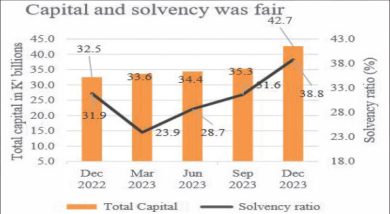Study dashes hope on fertiliser manufacturingcould
A study conducted by Fertiliser Association of Malawi says Malawi is unlikely to have the capability to manufacture fertiliser locally largely due to lack of raw metarials such as phosphate and potassium.
This dashes the country’s hopes of becoming a major manufacturer of domestically-consumed fertiliser in the foreseeable future.

In its analysis of fertiliser manufacturing in Malawi, the association said Malawi has only two options.
Reads the analysis in part: “The first option is for Malawi to import the nutrients and combine them according to formula specifications suitable for our soils through the process of steam granulations or bulk blending.
“The second option is the green ammonia process which presents an opportunity to produce nitrogen locally.”
Currently, there are two major companies using these two processes in Malawi, namely Optichem and Malawi Fertiliser Company.
Speaking in an interview on Tuesday, the association’s executive administrator Mbawaka Phiri said promoting fertiliser production can be done through concessionary tax rates to fertiliser producers which would enable companies to pay off investments faster and also stimulate further investments.
“Giving fertiliser producer’s preferential status for the future government procurement would priotise those companies who are benefiting local supply chains and local labour,” she said.
The National Fertiliser Policy priotises the development of the fertiliser industry.
Under policy priority area five, the Malawi Government commits to encourage private sector participation through, among others, creating financing facilities, facilitating matching grants and loans as well as facilitating long-term investments in the fertiliser industry.
The association’s data shows that annually, Optichem produces about 20 000 metric tonnes (MT) using steam granulation and granulates key ingredients such as phosphate, potassium and nitrogen and combine them with raw materials.
It said on the other hand, blending technology is considered appropriate where between 25 and 40 percent of finished product could be sourced from raw materials found in Malawi.
The association’s data further shows that blending one metric tonne of NPK could save the economy $16.4 million (about K17 billion) in imports and foreign exchange.
If used at full capacity, the two companies blend about 385 000MT of fertiliser per year, which is about 85 percent of the country’s total fertiliser consumption.
The market price of fertiliser in Malawi has, in nominal terms, more than tripled in two years from around K17 000 per 50 kilogramme (kg) bag from around K75 000 per bag.
Experts say the price hikes are linked to global events such as the Covid-19 pandemic and Russia’s invasion of Ukraine, whic has disrupted the global supply chain of goods.





One Comment